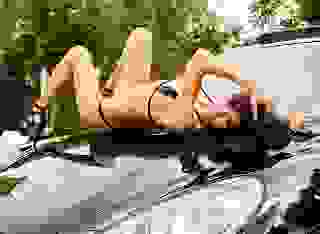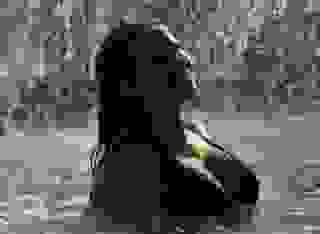- Sci-Fi & Fantasy
- First You Make a Stone of Your Heart Pt. 02: The Amaranth
Note: You can change font size, font face, and turn on dark mode by clicking the "A" icon tab in the Story Info Box.
You can temporarily switch back to a Classic Literotica® experience during our ongoing public Beta testing. Please consider leaving feedback on issues you experience or suggest improvements.
Click hereBeaufort, South Carolina
A park bench in shade, one of many that line the water's edge. A red brick walkway, uneven, worn down by time and shaded by overhanging live oaks -- some draped with lingering strands of Spanish moss. A woman, a uniformed woman, dressed as a chef -- perhaps -- or perhaps a waitress. She looks carewarn, almost depressed as her mind processes the words on the sheet of crisp, white paper in her hand.
She sits on one of the benches by the water's edge, lost inside a rose garden of meandering implications, not quite sure how to proceed amongst the traceries of thorns, not at all sure what even her next step might look like. She turns away from the paper and shakes her head -- a brief, imperceptible shake to the casual passersby -- as she watches the incessant parade of boats and barges moving along this stretch of the Intracoastal waterway, and she wonders where all the people out there are headed. A small marina just to her right is not even half full of boats -- but rarely do people head down to their toys this time of year.
She looks down at her phone and checks the time -- it is one-fifty in the afternoon and she realizes she must go up to the restaurant now -- one last time. The notice in her hand has advised that after almost 150 years both the restaurant and the inn will be closing tonight...for good. This will be her last day of work, and despite all the swirling uncertainty ahead she doesn't know quite what to feel. She has worked in the kitchen for a few years, yet she has few friends.
A freshening breeze fills in from the north and little arcing williwaws race across the water. She watches a passing boat for a moment longer then shrugs before she turns and walks through the little park to the inn.
Marine Corps Air Station Beaufort (Merritt Field)
The civilian yacht had been tied off at the fueling docks at the end of Quilali Road, adjacent to a row of patrol boats lined up like sharks' teeth, their bows pointing into the Intracoastal waterway in a passive display of military precision. All of the patrol boats are on high alert, their gun stations reporting manned and ready; two Block Three F-35Bs circle ten thousand feet overhead, their sensors trained on the seaward approaches to Beaufort and Hilton Head Island, while an Air Force RC-135S 'Cobra Ball' MASINT aircraft orbits the area at flight level three-four-zero, her medium wave infrared array turned skyward as her operators watch, and listen to, Russian and Chinese satellite operations half a world away.
A half-hour window is about to open, and during this brief pause in satellite surveillance a civilian Gulfstream business jet will touch down at Merritt Field; its three passengers will be rushed to the waiting yacht and the business jet will takeoff and return to her original routing to Jacksonville, Florida. Once everyone is aboard, the yacht's crew will cast off her lines and head to the seawall off Chambers Park, in central Beaufort, and tie up for the night. And this would mark the beginning of the most dangerous, not to mention consequential, phase of the hastily planned operation.
Admiral James 'Spudz' MacKenzie sat in the radio room just aft of the yacht's bridge, talking with the colonel in command of the old Boeing circling miles overhead. "Anything new?" MacKenzie asked. "No changes in orbits? Anywhere?"
"Nothing," came the crystal clear reply from Colonel Jim Parker. "No changes in orbital trajectory; no launch detections. Congrats, Spuds. Looks like you've spoofed 'em."
MacKenzie nodded while he looked at the countdown timer on an adjacent display, then picked up the mic to VHF COMMs 3: "Merritt, Nord 1. Stop repeat go."
"Go repeat stop," came the garbled, static-filled reply.
MacKenzie switched over to Merritt's main tower frequency and listened in as the Gulfstream made its quick approach; as soon as the jet was on the ground MacKenzie turned to Command Master Chief Jim Turner and nodded. "Secure all fuel lines, standby to cast off."
"Aye, Admiral."
"Tanks full?" MacKenzie added.
"Seventeen thousand, five hundred gallons onboard, Sir. Fuel pre-heated and polished."
"Okay, Jim. You better go see to the deck." Turner saluted and started to turn -- but MacKenzie stopped him short, then hastily added for the umpteenth time: "And Jim, in case you've forgotten...please recall that I am in fact retired. Okay? No salutes? Understood?"
"Yes, Admiral."
Turner had been with MacKenzie since the late 90s, during his two years as CO of the Constellation, and he'd been with MacKenzie ever since. First following him to the Joint Analysis Centre at RAF Molesworth and then on to the Pentagon, when the freshly minted admiral began working in the Joint Intelligence Center, he tagged along when MacKenzie was sent to the White House as the president's naval attaché. With some presidential arm twisting, MacKenzie spent his last year in uniform working with the State Department's Bureau of Intelligence and Research before, once both had officially retired, Turner joined his admiral when the Old Man took a position at Northrop-Grumman -- until the very same president twisted MacKenzie's arm -- once again -- and sent him back to the Pentagon -- again -- this time as Secretary of Defense.
And that, Turner had wittily observed more than once, was when things got really weird, and after which things soon turned very, very dark.
Beaufort, South Carolina
The mood in the inn was very, very dark, way beyond palpably depressed. People who had worked at the inn's restaurant, and for quite literally decades, had no frame of reference to deal with their sudden unmooring. Cast adrift as if miles from shore and with no idea which way to swim, the older waitstaff and kitchen crew had devoted their professional lives to carrying on the restaurant's fully justified 144-year-old reputation.
She watched these people going about their routines as if they were functioning on some kind of emotional autopilot, their forced smiles and easy shrugs worn like masks to hide the cascades of emotion she assumed each felt. Yet she hid behind her work, carefully shaved a handful of fresh shards from a new block of parmesan and placed them ever-so-delicately atop a perfectly prepared bowl of shrimp & grits, then sprinkled thinly sliced rondels of crisp green scallion on the cheese. She looked over her plates, as always her own worst critic, and hit the pickup light to summon the waitress who would serve her latest creation.
She turned and looked at the clock over the door that led to the dining room and saw they were down to their final hour, and just then one of the waitresses she had almost grown friendly with walked into the kitchen and right up to her.
"Well, well, well...lucky you," the old waitress asked. "Guess who's coming to dinner?"
Sara Caldwell simply shrugged off the question, because in a way -- none of that mattered anymore.
"It's your favorite customer, if you know what I mean?" the waitress added a little too salaciously.
"Spudz? Is he here?" she asked. "Really?"
"He just got off a boat and is walking through the park right now."
"That's not a boat," Lucien Rousseau sighed, "that's a yacht...with a capital Y." Lucien was the youngest member of the dining room crew and he usually waited on Spuds whenever he happened by -- which wasn't all that frequently. But the old man had appeared to take a real interest in Caldwell almost two months ago, and whenever he was in town he made it a point to visit the inn and always made it a point to speak to Sara, complimenting her obvious skills in the kitchen and usually asking her to take a walk with him after the restaurant closed for the evening. He was always very polite, almost gentile; everyone referred to him as 'old school,' a real old-fashioned gentleman, and she'd begun to look forward to his visits.
And now she suspected she'd lose even that modest sense of connection, too, and it hit her just then. This was what it felt like to miss someone, even though she and Spudz had never done anything more than take a few brief walks in the park together. He was polite, almost solicitously so, and she often had felt that he really cared about her. Then again, she'd had no idea that he had a boat, or a yacht, or whatever Lucien thought it was, so in the end he was realistically little more than a stranger passing through her life.
She went back to work and wasn't at all surprised when his order for filet mignon Marchand de Vin came in; he always ordered the same thing, daring to change only what he had as an appetizer. And he always dressed for dinner, never came dressed casually. And, as had always been the case, he finished his meal a few minutes after the restaurant closed and then asked to speak with her.
But tonight she really didn't know how to proceed. Tell him about the inn closing, the restaurant too? How would he take it?
He was in the main dining room with his back to the kitchen, his close-cropped steel-gray hair instantly recognizable to her. She threw aside the caution she normally felt as easily as she had her apron and did her best to smile as she walked through the remaining dinner guests, stopping to ask each table if their evenings had been satisfactory, and then she was there, standing by his side.
"Was your filet as good as you remembered?" she asked as she walked up to his side of the table.
He stood quickly, attentively and walked around the table to the empty chair opposite his own. "Sara. Please, would you join me for a modest libation?"
This was something new; he was breaking their script, taking a new way forward.
She saw two untouched drinks on the table as he pulled out the chair; with his eyes he was asking, no -- pleading with her to join him, and she couldn't resist the sincerity she felt on his face. She nodded and sat, and he went back to his chair and joined her.
"Drambuie," he said, picking up his glass. "I hope that's alright."
She nodded and smiled. "It's perfect," she sighed, watching him watching her.
"Lucien told me the news. How are you holding up?"
"I haven't...I really haven't had time to process everything yet."
"I can't imagine what you must be feeling. Any idea what you might do next?"
"No. None."
He nodded and looked away for a moment, then turned and looked at the massive yacht tied-off by the benches in the park...
"Is that yours," she asked.
"It is," he said, turning back to face her.
"What's her name?"
"Amaranth."
She blinked rapidly then looked away for a moment, and he found he couldn't take his eyes off hers.
"Isn't that a type of plant?"
He nodded. "Yes, just so. However, in Attic Greek, it translates roughly as immortal."
"Ah. I remember one variety of the plant is called Love Lies Bleeding," she said, now looking him directly in the eye.
"You have to love the British," he rejoined, now watching her intently.
"How so?"
"Prolific gardeners. A bit florid, I suppose, but c'est la guerre."
"Ah. So, you love the British?"
"I suppose we all have an affinity with our original homelands. I'm sorry, but the Drambuie isn't to your liking?" he asked, noting that she had yet to pick up her glass.
"I don't drink," she said, her voice dull, flat, emotionless.
"Ah. Care to take a walk? I know, I know, it's cool out, but..."
"So, you want to show me your etchings," she replied, now smiling just so, almost provocatively.
"Would you like to come aboard?"
She stood and he stood again, quickly, reflexively. "Let's take a walk," she sighed.
They walked down the red brick promenade towards the water and she found it impossible to take her eyes off his brightly lighted yacht. It had three levels -- that she could see, anyway -- and the light gray hull and gleaming white superstructure looked huge surrounded by the blackness of night -- almost looking like a ship suspended in the black ink of space.
"Amaranth..." she whispered. "Do you think yourself immortal, Spudz?"
"Me? Goodness, no. The sea, I think...the sea is immortal."
"Where are you going now?" she asked, stopping and turning to look at him.
He shrugged, an indifferent, noncommittal shrug. "I'm not sure yet." He turned to face her, his eyes locking on hers, and for a moment he felt like he was back on the Connie, on her bridge turning his ship into the wind. "So tell me. If you could pack up and go right now, and I mean go anywhere, where do you think you might go?"
"Far away," she whispered without the slightest hesitation. "As far away as I could get."
He reached out and took her hand, his eyes now boring into hers. "Sara, what...or who are you running from?"
She gently shrugged away from the question but then, after hesitating on the icy precipice of indecision, she leaned into him, wrapping her arms around his waist, the side of her face settling softly, almost naturally against his shoulder. "I don't...I wish I knew," she just managed to say -- before a sudden tremor passed through the moment.
Almost caught off guard, MacKenzie leaned into her, held her fast against the opposing tides of doubt and destiny, unsure what all this meant but wanting to meet the measure of the moment, the measure of her need. "I guess I probably shouldn't mention this again," he whispered, "but would you like to come aboard, maybe take a look around? With me?"
"When are you leaving?" she asked.
"Is there anything here you need? Clothing? Medications?"
"No. Not really." She leaned back, not wanting to let go of him -- or the moment. "Is there anything I could do?"
"Onboard? No, not really, unless you wanted to cook."
"You...need a cook?"
He smiled, then just sort of shrugged, and like a kid caught with his hand in the cookie jar he rolled his eyes. "Well, I reckon we could make a go of it on bologna sandwiches for a while."
"How many people are on board?"
"Three guests, and I've got five people helping out. People who used to work with me."
"Oh?"
"Co-workers that, well, they're all the family I have."
"Is there room for me?"
"Yup. Your own stateroom, complete with head."
"Do you think maybe I could stay with you for a while?"
His head canted quizzically just a bit and he felt a completely unexpected flush of excitement roll from his brow as he continued to hold her in his eyes. "Would you like that?" he asked after what felt like a lifetime had passed.
"I've been alone for a long time, Spudz. A really long time..."
He nodded, his eyes brimming with empathy. "So have I."
"I've never really felt like I could trust anyone, you know? Not until I met you, anyway."
His stomach lurched and knotted -- and suddenly he felt like the lowest form of life there is -- but he nodded and held her close. "I know, I know," he whispered. "I've felt that way too," he added, perhaps a little evasively.
"What's wrong?" she asked, concern growing in her eyes as she heard -- and felt -- a darkening change come over him.
"Sara, can't you tell me what you're running from? I'd really like to...no, that's not quite right...I need to know..."
She pushed away gently, looked into his eyes -- searching for the truth of the moment: "I haven't broken any...no one's after me..."
"No one?" he asked, his eyes cold and hard.
She looked away, then shrugged.
"Are you in any danger? Sara? Please, no evasions. I have to know."
"I don't know," she sighed, suddenly tired of this life all over again. That was why she had run away the first time, and every time since. Only now she felt like she was running out of time. Like her life was running on empty and now, suddenly there was nowhere to run or no one to turn to -- if only to make the noise all stop.
She needed more signal. Not all this noise.
But then a voice called out -- from within the darkness of Amaranth.
"Admiral, it's 22:30. Slack water in ten."
MacKenzie turned to the boat and nodded, then he faced Sara. "The choice is yours, Sara. I'd love to have you with me on this trip..."
"You never answered my question. Could I stay with you?"
His acquiescence went unspoken; instead he simply kissed her forehead and took her hand. "Let's go," he said, finally, though he waited for her to make the first step towards his little ship.
She looked at the ship and then gave his hand a gentle squeeze as she started down the bricks to the water's edge.
+++++
Two hundred and thirty miles overhead cameras within a NRO orbital surveillance satellite tracked her every movement, waiting for one of the small blue spheres to arrive.
+++++
Spudz stood at the wheel, his eyes focused on the depth sounder and the forward scanning sonar, slowly, carefully threading Amaranth through the shifting mud and sand-bottomed channel after leaving the seawall. The sounder was showing just two feet under the keel, so Amaranth's nine-foot draft presented a serious challenge to the careless navigator. To make their departure more interesting, the first few hundred yards of the channel passed through a no-wake zone, meaning his NordHavn 120 had to proceed with its twin throttles almost at idle, and contrary to expectations the best route for his deep keel did not follow the center of the channel. Instead, he guided her to the starboard, side of the channel -- which was fractionally deeper.
Sara stood by his side, watching his hands on the wheel and throttles.
She had noted his hands the first time they met. They had looked clean and almost delicate, yet visibly very dexterous, and she'd at first thought he must be a surgeon -- but no longer. She saw two throttles under his right hand now, yet he manipulated them individually; a little left forward throttle here, yet every few seconds, as the sounder and sonar painted a vibrant picture of the way ahead, he'd slip the right throttle into neutral, and occasionally into reverse, in effect yawing the vessel around underwater objects as he approached each one. It was slow-going, almost excruciating to watch -- because one slip up here could drive the ship's 850,000 pound displacement hull deep into the soft mud. It would cost, she imagined, thousands to affect a recovery -- under even the most favorable conditions.
He was steering for a flashing red light, a red channel marker, he said, and as they passed this mark he asked her if she could read the number painted on it.
"240, and the marker looks red, too."
"Got it," he sighed before his eyes left the sonar display. "Fourteen feet now," he said absently as he began steering for the next channel marker, a flashing green light a few hundred yards ahead. "Oh, swell," he snarled suddenly, and Sara looked ahead and noted that the air was condensing -- which could only mean one thing: fog. Spudz opened another display and pulled up the outside air temp and relative humidity and grumbled something about dew point and that this wasn't exactly the best time to run into dense fog, yet as they watched the air just above the water turned milky white...
...and Jim Turner walked onto the bridge and looked around, then over to MacKenzie. He assayed the situation, turned on the radar and assigned that readout to the screen in front of the admiral, overlaying the radar's information on top of the marine chart and putting the sonar's screen on an adjacent display.
"Everything stowed?" MacKenzie asked Turner.
"Aye, sir."
MacKenzie grumbled and shook his head, knowing that Turner would never be able to address him as anything other than the four-star admiral he'd been, then he scanned the sonar display and corrected his course to clear a very large submerged tree limb. "This still a No Wake Zone?" he asked Turner, his attention still on the submerged hazard.
"Yessir, all the way to the bridge."
MacKenzie noted the depth ahead was in the twenty-foot range, so he let himself relax a little, but then he looked up and noted the fog had suddenly grown so thick he could barely see the waving ensign on Amaranth's bow. Instinctively he throttled back -- until the boat was just maintaining effective steering speed -- as he used the chart plotter and sonar to keep in the deepest part of the channel.








